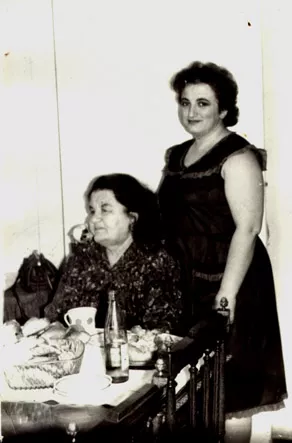I am sitting at the table and my daughter Maya. is standing. She and I were photographed in our kitchen by my husband. This photo was taken in Mogilyov-Podolskiy in 1972.
In 1947 I went to work as the seller of a fish. So, I worked as a fish vendor in a kiosk at the central market for the rest of my life. I retired from there. It was hard work. There were no loaders and I had to carry heavy boxes with frozen fish and cut heavy briquettes into pieces. I never had a chance to sit down during the day: there were always customers lining up; I had no breaks. There was no heating in the kiosk: it was freezing in winter, and it was hot in summer. I didn't go on vacation trying to earn more. My customers liked me: I joked and was cheerful and tried to serve them as best as I could. There were 3 fish kiosks one next to another, but there were always people lining to my kiosk. It's a small town where people know each other, and I knew all of my customers.
I got married in 1952. Our neighbor introduced me to her distant relative Semyon Leiderman. After the war Semyon stayed in Mogilyov-Podolskiy. He went to work as a turner at the mechanical plant, which was later converted into the plant of agricultural machine building named after Kirov. We lived in our little house with my parents and my younger sister Nyusia after the wedding. Our older son David was born in 1953, and our daughter Maya was born in 1957. We did not raise them Jews. We spoke Russian with the children. I spoke Yiddish to my parents and my husband and I switched to Yiddish, when we did not want our children to understand the subject of our discussion. We celebrated Jewish holidays, when we lived with our parents. Our parents also celebrated Soviet holidays with us. In the early 1960s the plant where my husband and father were working built an apartment house for its workers and we received apartments in this house. In 1980s after my parents died we gave up religion and never again celebrated Jewish holidays. We celebrated birthdays of members of the family, New Year and Victory Day. The other Soviet holidays were just ordinary days off for us.
I introduced Maya to Igor Kotliar in 1975. They got married shortly after their acquaintance. They didn't have a Jewish wedding. My daughter and her husband lived with us. Maya worked as a shop assistant at the store. Their older daughter was born in 1977. She was named Zinaida after my older sister Zina who died from cancer in 1973. My second granddaughter Irina was born in 1984. She was named after my father, who died in 1981, the first letters in their names are the same.
We could hardly make ends meet. Besides, I tried to save some money hoping that when my husband and I retired, we would travel and enjoy ourselves. I took these savings to the bank. We had never traveled on vacation. Besides, we didn’t want to be a burden for our daughter, when we grew old: old people need medications and doctors and this all requires money. We were hoping that we would manage at our old age having our savings, but then perestroika began, and all our hopes turned into ashes. The material level of living grew lower; our savings decreased in value and then were gone [The disintegration of the USSR in 1991 also resulted in the newly independent states introducing their own national currencies. Soviet Ruble ceased existing. Many people lost their life-time savings]. My husband and I were pensioners at this time. Again we were starving. Our pensions were hardly sufficient to pay our apartment fees and just for the most necessary food.















